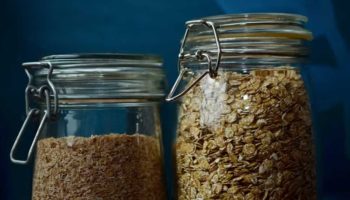Cooking not only creates delicious dishes, but unfortunately, it also quickly creates stubborn grease deposits on the kitchen cabinets. Fortunately, there are these two home remedies that can easily remove the grease.
Anyone who loves to cook knows the problem: over time, a stubborn layer of grease builds up on the surface of kitchen cabinets above and next to the stove. This occurs when fat particles rise with the vapors during cooking and settle on the surfaces. This happens quickly, especially if there is no or inadequately functioning extractor hood above the stove. Together with dust and other dirt particles, a sticky layer of grease now forms that you can’t easily get rid of. But before you reach for expensive and environmentally harmful chemical cleaners, you should first try home remedies. We know two solutions that remove grease from kitchen cabinets particularly effectively.
Remove grease from kitchen cabinets with home remedies
The two miracle remedies are, of course, called baking soda and lemon juice. Universally known as effective DIY cleaning products for all sorts of purposes, you can also effectively remove grease from your kitchen cabinets (and other surfaces) with these two home remedies. All you need is half a cup of baking soda and a squeeze of lemon juice.
Mix the baking soda with a cup of water and add the squeeze of lemon juice. Stir the mixture until the baking soda has dissolved. Then, dip a sponge or a cleaning cloth in the natural cleaning agent and rub it on the affected areas on the kitchen cabinets. Baking soda plus lemon juice makes a grease-dissolving mixture that can remove even stubborn layers of grease. Let the cleaner sit for a few minutes before wiping your kitchen cabinets again with a damp cloth. That’s it, and your kitchen will shine in new splendor.
Do not clean these surfaces with baking soda
As effective as the combination of baking soda and lemon juice is, you should still first check what material the surfaces of your kitchen cabinets are made of. For example, baking soda is not suitable for high-gloss kitchens. Similarly, surfaces made of untreated wood, glass or aluminum are not suitable for cleaning with baking soda, as the delicate materials can easily scratch. In such a case, it is better to use a suitable liquid cleaner, such as glass cleaner.
Otherwise, however, baking soda and lemon juice are an unbeatable combination that not only gets to grips with grease. Limescale in the bathroom, stickers on surfaces, blood stains or dirt in the oven can also be effectively cleaned with baking soda and lemon juice. In addition, home remedies are ideal for removing urine scale in the toilet and sweat stains from white clothes.



